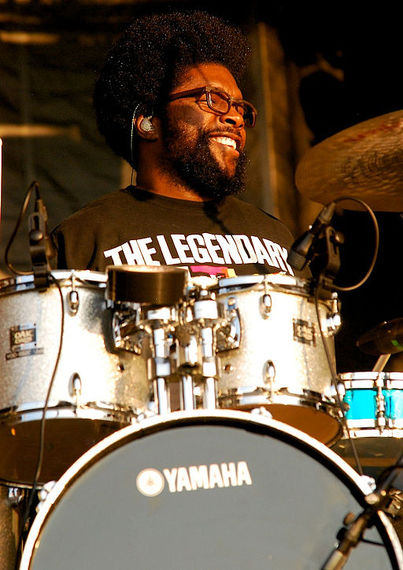What do John Bradford, Albert Einstein and Ice Cube have in common?
Well... nothing.
But in the first installment of his Vulture series entitled, When the People Cheer: How Hip-Hop Failed Black America, the Roots rhythm man employs quotes from all three to make a stunning -- and controversial -- point.
How? It's not as convoluted as it sounds. Bradford once said, "There but for the grace of God go I," a quote often used to remind us to have compassion for the "less fortunate" among us.
Einstein once described quantum entanglement as "spooky action at a distance," a statement that Questlove interprets as a belief that all creatures of Earth are all connected, "whether or not there's a clear line of connection."
Ice Cube's contribution? "Life ain't nothing but bitches and money."
Questlove's own philosophical "quest" begins right there, at the point where the compassionate "connections" described by the previous two philosophers began to erode.
Ice Cube, he says:
...seems to be talking about life's basic appetites -- what's under the lid of the id -- but is in fact proposing a world where that social contract is destroyed, where everyone aspires to improve themselves and only themselves, thoughts of others be damned. What kind of world does that create?
Tough question. One he really will need six installments to answer.
But he does gives us a glimpse of the route he's taking. Black music, he says, has been taken over by hip-hop -- nearly all of the most popular artists in Black music are considered "hip-hop" stars. Consequently, hip-hop, once a powerful voice of inner-city youth and others who sought to resist mainstream culture, is now an integral part of the "sullen dominant," as Questlove calls it.
He has also grown weary of artists at the top of the hip-hop hierarchy making art that mostly celebrates being at the top of the hip-hop hierarchy -- meaningless, cynical stuff created and packaged to appeal to the masses.
"Meaninglessness takes hold because meaninglessness is addictive," he posits. A bold, brave statement.
So is the entire first installment, which includes an entertaining and engrossing history of the genre and a hilarious take on a familiar fallacy:
"Someone mentioned the changing nature of the pop-culture game, and it made him nostalgic for the soul music of his youth. 'It'll be back,' he said. "Things go in cycles,'" he writes. "But... If you really track the ways that music has changed over the past 200 years, the only thing that goes in cycles is old men talking about how things go in cycles."
So, will hip-hop "be back?" Or has it outlived and outgrown its usefulness, and failed the Black community in the process, as Questlove suggests?
"Time will tell. Time is always telling. Time never stops telling," Questlove writes.
Given the remarkable insights he has offered thus far, it's going to be hard to wait for Questlove to tell us more.
Image credit: By Brennan Schnell (Flickr), via Wikimedia Commons

